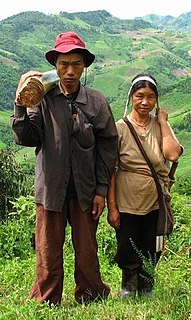Health care reform- is for the most part, governmental policy that affects health care delivery in a given place. Health care reform typically attempts to:

Herbert Alexander Simon was an American economist, political scientist and cognitive psychologist, whose primary research interest was decision-making within organizations and is best known for the theories of "bounded rationality" and "satisficing". He received the Nobel Prize in Economics in 1978 and the Turing Award in 1975. His research was noted for its interdisciplinary nature and spanned across the fields of cognitive science, computer science, public administration, management, and political science. He was at Carnegie Mellon University for most of his career, from 1949 to 2001.

Retirement is the withdrawal from one's position or occupation or from one's active working life. A person may also semi-retire by reducing work hours.
A health system, also sometimes referred to as health care system or as healthcare system, is the organization of people, institutions, and resources that deliver health care services to meet the health needs of target populations.

In psychology, decision-making is regarded as the cognitive process resulting in the selection of a belief or a course of action among several alternative possibilities. Every decision-making process produces a final choice, which may or may not prompt action.
Development communication refers to the use of communication to facilitate social development. Development communication engages stakeholders and policy makers, establishes conducive environments, assesses risks and opportunities and promotes information exchanges to create positive social change via sustainable development. Development communication techniques include information dissemination and education, behavior change, social marketing, social mobilization, media advocacy, communication for social change, and community participation.
Primary Health Care, or PHC, refers to "essential health care" that is based on scientifically sound and socially acceptable methods and technology, which make universal health care accessible to all individuals and families in a community. It is through their full participation and at a cost that the community and the country can afford to maintain at every stage of their development in the spirit of self-reliance and self-determination. In other words, PHC is an approach to health beyond the traditional health care system that focuses on health equity-producing social policy. PHC includes all areas that play a role in health, such as access to health services, environment and lifestyle. Thus, primary healthcare and public health measures, taken together, may be considered as the cornerstones of universal health systems. The World Health Organization, or WHO, elaborates on the goals of PHC as defined by three major categories, "empowering people and communities, multisectoral policy and action; and primary care and essential public health functions as the core of integrated health services[1]." Based on these definitions, PHC can not only help an individual after being diagnosed with a disease or disorder, but actively prevent such issues by understanding the individual as a whole.
The Earth Institute was established at Columbia University in 1995. The research institute's stated mission is to address complex issues facing the planet and its inhabitants, with a focus on sustainable development. With an interdisciplinary approach this includes research in climate change, geology, global health, economics, management, agriculture, ecosystems, urbanization, energy, hazards, and water. The Earth Institute's activities are guided by the idea that science and technological tools that already exist could be applied to greatly improve conditions for the world's poor, while preserving the natural systems that support life on Earth.
Utilization Management (UM) is the use of techniques that allow purchasers to manage the cost of health care benefits by assessing its appropriateness before it is provided using evidence-based criteria or guidelines. Critics have argued if cost cutting by insurers is the focus of their use of UM criteria, it could lead to overzealous denial of care as well as retrospective denial of payment, delays in care, or unexpected financial risks to patients.
The following outline is provided as an overview of and topical guide to management:

The European Institute for Health Records or EuroRec Institute is a non-profit organization founded in 2002 as part of the ProRec initiative. On 13 May 2003, the institute was established as a non-profit organization under French law. Current President of EuroRec is Prof. Dipak Kalra. The institute is involved in the promotion of high quality Electronic Health Record systems in the European Union. One of the main missions of the institute is to support, as the European authorised certification body, EHRs certification development, testing and assessment by defining functional and other criteria.

The philosophy of healthcare is the study of the ethics, processes, and people which constitute the maintenance of health for human beings. For the most part, however, the philosophy of healthcare is best approached as an indelible component of human social structures. That is, the societal institution of healthcare can be seen as a necessary phenomenon of human civilization whereby an individual continually seeks to improve, mend, and alter the overall nature and quality of their life. This perennial concern is especially prominent in modern political liberalism, wherein health has been understood as the foundational good necessary for public life.
Geriatric medicine in Egypt as a speciality was introduced in 1982, and in 1984 a Geriatrics and Gerontology unit in Ain Shams University Faculty of Medicine was established.
MEASURE Evaluation strengthens capacity in developing countries to gather, interpret, and use data to improve health. MEASURE Evaluation creates tools and approaches for rigorous evaluations, providing evidence to address health challenges, and strengthens health information systems so countries can make better decisions and sustain good health outcomes over time. MEASURE Evaluation is a cooperative agreement awarded by the U.S. Agency for International Development (USAID) to the Carolina Population Center at the University of North Carolina at Chapel Hill and five partner organizations: ICF International, John Snow Inc., Management Sciences for Health, Palladium, and Tulane University. This MEASURE Evaluation partnership provides technical leadership through collaboration at local, national, and global levels to build the sustainable capacity of developing nations to identify data needs, collect and analyze technically sound data, and use that data for health decision-making.
TARKI Social Research Institute is an independent research centre located in Budapest, Hungary. TARKI conducts applied socioeconomic research in social stratification, labour markets, income distribution, intergenerational transfers, tax-benefit systems, consumption and lifestyle patterns and attitudes. Senior staff at TARKI all have PhD’s and many hold professorial appointments at major universities.
Sustainability organizations are (1) organized groups of people that aim to advance sustainability and/or (2) those actions of organizing something sustainably. Unlike many business organizations, sustainability organizations are not limited to implementing sustainability strategies which provide them with economic and cultural benefits attained through environmental responsibility. For sustainability organizations, sustainability can also be an end in itself without further justifications.
An Accountable Care Organization (ACO) is a healthcare organization that ties payments to quality metrics and the cost of care. ACOs in the United States are formed from a group of coordinated health-care practitioners. They use alternative payment models, normally, capitation. The organization is accountable to patients and third-party payers for the quality, appropriateness and efficiency of its services. According to the Centers for Medicare and Medicaid Services, an ACO is "an organization of health care practitioners that agrees to be accountable for the quality, cost, and overall care of Medicare beneficiaries who are enrolled in the traditional fee-for-service program who are assigned to it".
The following outline is provided as an overview of and topical guide to social science:
The Donabedian model is a conceptual model that provides a framework for examining health services and evaluating quality of health care. According to the model, information about quality of care can be drawn from three categories: “structure,” “process,” and “outcomes." Structure describes the context in which care is delivered, including hospital buildings, staff, financing, and equipment. Process denotes the transactions between patients and providers throughout the delivery of healthcare. Finally, outcomes refer to the effects of healthcare on the health status of patients and populations. Avedis Donabedian, a physician and health services researcher at the University of Michigan, developed the original model in 1966. While there are other quality of care frameworks, including the World Health Organization (WHO)-Recommended Quality of Care Framework and the Bamako Initiative, the Donabedian Model continues to be the dominant paradigm for assessing the quality of health care.
The Patient-Reported Outcomes Measurement Information System (PROMIS) provides clinicians and researchers access to reliable, valid, and flexible measures of health status that assess physical, mental, and social well–being from the patient perspective. PROMIS measures are standardized, allowing for assessment of many patient-reported outcome domains—including pain, fatigue, emotional distress, physical functioning and social role participation—based on common metrics that allow for comparisons across domains, across chronic diseases, and with the general population. Further, PROMIS tools allow for computer adaptive testing, efficiently achieving precise measurement of health status domains with few items. There are PROMIS measures for both adults and children. PROMIS was established in 2004 with funding from the National Institutes of Health (NIH) as one of the initiatives of the NIH Roadmap for Medical Research.













